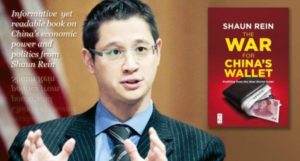
Slow, bureaucratic and not eager to innovate. In many ways Western companies seem different from their Chinese counterparts. Those Chinese companies are not only growing like crazy, they innovate fast and increasingly organize themselves differently, internally, how they invest in other companies and deal with their competitors. Tencent, Alibaba and Baidu are the biggest names, but under the private enterprises in China, they are certainly not alone. Take Haier, Huawei, Yili, Mengniu and Xiaomi.
So, what do those Chinese private companies do different from Western companies in how they organize themselves, deal with the outside world? And is there any way companies outside China can learn from the way Chinese companies do it different? They make better use of artificial intelligence and big data, but underneath they show fundamental different structures that might be equally important. While much of the Western companies often reflect the military basis of organizing business, Chinese companies started to erase their middle management, thrived on internal competition and moved away from traditional business structures.
A group of speakers at the China Speakers Bureau has been looking at those differences. Some looked at individual companies, but increasingly people are starting to look at patterns. We offer a group of speakers who can help you in discovering how your company can do things better.

Shaun Rein is the Managing Director of the China Market Research Group (CMR), the world’s leading strategic market intelligence firm focused on China. He is one of the world’s recognized thought leaders on strategy consulting in China.
He is author of The War for China’s Wallet: Profiting from the New World Order and explains how different Chinese private firms are:
Chinese corporate culture at private Chinese companies is characterized by fast decision-making with less bureaucracy than at most multi-national corporations. This allows them to adjust quickly to consumer needs, especially in fast-moving markets like China. Chinese firms like Mengniu and Yili were able to launch more new ice cream products more quickly than global competitors like Nestle, for example. These companies move very fast because Chinese entrepreneurs tend to be ambitious, aggressive and risk-taking, and will bet the farm on new products and services. They also are getting the support of the government and state-owned banks that give them low interest loans.
Are you looking for more stories by Shaun Rein? Do check out this list.

William Bao Bean is investment Partner at SOS Ventures and Managing Director of Chinaccelerator, the first and longest running startup accelerator program in China based out of Shanghai
He has been helping Chinese startups to to global and international startups to enter China. Dealing with larger companies in IT, telecom, banking and other industries helped him to understand what China’s private companies makes different.
Are you looking for more stories by William Bao Bean? Do check this list.

Bill Fischer, IMD professor and author of Reinventing Giants: How Chinese Global Competitor Haier Has Changed the Way Big Companies Transform, looked at white goods manufacturer Haier and how they got rid of their middle management.
Just as observed by Bill Fischer, “The transformation of Haier is bold, destructive, validated and inclusive. Meanwhile, Haier also rethinks its organizational structure and functions.”
Since the launch of its “Rendanheyi” model in 2005, Haier has made changes in three aspects over the more than 10 years of exploration. The first change is about the company. Haier has transformed itself from a traditional enterprise into a networked one which serves as a node on the Internet. The second change is about the brand. In the past, Haier was often associated with home appliances. Today, Haier is more associated with entrepreneurs. The third change is about employees, each of whom has been gave the opportunity to become an entrepreneur who can start up his or her business on Haier platform to directly create value for customers.
“Haier has changed the way everyone thinks of management, leadership and organization in the future.” exclaimed Bill Fischer as he witnessed how Haier transformed itself from “a producer of products” into “a producer of entrepreneurs” and how it drives the upgrade of microenterprises through capital socialization throughout the process. Zhang Ruimin is turning Haier’s employees into entrepreneurs running their own microenterprises. Bill Fischer called this a “great disruption”.

Zhang Ying is professor on entrepreneurship and innovation at Rotterdam School of Management, Erasmus University.
Zhang Ying can cover a wide range of China related subjects, including Chinese economy and its transition, Chinese firms catching up in the world, Chinese entrepreneurship and digital transformation (fin-tech to fin-life).
She started March 2017 a partnership between Huawei and RSM on digital education.
In April 2017 Harvard Business School published a case study on Ant Financial, formerly known as Alipay, of the Alibaba Group with Zhang Ying as co-author.
Are you looking for more stories by Zhang Ying? Do check this list.

Mark Schaub, Shanghai-based partner at King&Wood and Mallesons, the largest law firm in China and Australia combined.
He has met many Chinese companies on the legal battlefields with foreign companies. He saw both Chinese and foreign battants get scars in their conflicts, misunderstandings and other legal dealings.
Are you interested in more stories by Mark Schaub? Do check out this list.
